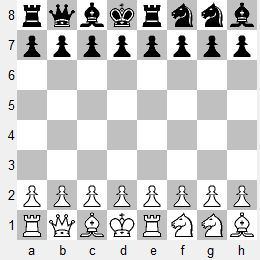- I presume -- in the spirit of the presumption of innocence -- that [all 960 start positions are] equal.
- The logical outcome of [any start position] is a draw.
- If one of the players wins [a] game, his opponent has certainly made some mistake.
Not as convincing as the same statements for traditional chess (SP518 RNBQKBNR), are they? To be clear, saying that 'all 960 start positions are equal', doesn't mean equal to each other; it means equal for White and Black, i.e. neither color starts with a winning advantage in any start position (SP). At this point in my chess960 education, I presume this is true, but I am far from convinced and wouldn't be surprised if this presumption turned out to be false. In the ongoing series of games I presented in Proof of Concept with HarryO, my sparring partner admitted that he doesn't have the same confidence that I do. He is certainly not alone.
Getting back to traditional chess, the foundation of the 'Black Is OK' philosophy rests entirely on the second point. To quote the original statement in full:
Qualified players will mostly come up with the same reply as a great number of world champions or chess thinkers since Lasker: the logical outcome of the game is a draw.If the 'qualified players' are right, as the accumulated experience suggests, then Black is OK; if they are not right, then there is a tree of related variations where all branches inevitably lead to a forced win for White, and Black is definitely *not* OK (ignoring the minute possibility that traditional chess is a forced win for Black, which is highly unlikely).
Since there aren't really any qualified players in chess960, and since the accumulated experience is skimpy at best, we just don't know if 'Black Is OK' across all SPs. All we have is our presumption of innocence, which is an act of faith. That brings me to the third point: a game is only lost because of a mistake. In chess960 it might indeed be lost because of a flaw in the start position. We will never know for sure, will we?
In his 'presumption of innocence' essay (see the '12 Discussion Points' post for a link), Adorjan touched on one metric that might be relevant. He mentioned that the ratio of White wins to Black wins in practice 'could be something like 55:45 in 100 games'. This corresponds to an observation I made in A Pawn Equals 200 Rating Points.
A difference of 40 rating points [value of first move as a fraction of a Pawn] gives the higher rated player a little less than a 0.56 chance of winning the game. This means a 56% expected score for White, and a 44% expected score for Black, which is close to the result derived from databases of historical master-level games.
Is this ratio related to the specific start position in SP518 or is it a function of the first move? Perhaps it is both. I'm afraid that, once again, we will never know for sure, will we!

